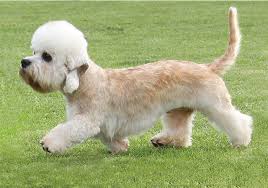
Dandie Dinmont Terrier
Conditions of detention
Dandie Dinmont Terriers are adaptable and can live comfortably in both apartments and houses. They are relatively low-energy indoors but enjoy regular outdoor activities.
Useful Fact: These dogs thrive in a home environment where they can be close to their family, as they are affectionate and enjoy companionship
Nutrition and diet
A balanced diet rich in high-quality proteins and fats is essential for maintaining the health and energy levels of Dandie Dinmont Terriers. Both high-quality commercial dog food and well-balanced homemade diets can meet their nutritional needs.
Useful Fact: Monitoring their weight and portion sizes is important, as they can be prone to obesity if overfed.
Health
Dandie Dinmont Terriers are generally healthy but can be prone to certain conditions such as intervertebral disc disease (due to their long back), glaucoma, and hypothyroidism. Regular veterinary check-ups and maintaining a healthy weight are essential.
Useful Fact: Providing steps or ramps to furniture can help prevent back strain and reduce the risk of spinal issues.
Grooming and care
Their unique coat requires regular grooming. The coat is a mixture of soft and hard hair, needing brushing several times a week to prevent matting and tangling. Professional grooming every few months can help maintain their appearance.
Useful Fact: Regularly cleaning their ears and trimming their nails is important to prevent infections and maintain overall hygiene.
Education and training
Dandie Dinmont Terriers are intelligent and eager to please but can be somewhat stubborn. Positive reinforcement training methods work best. Early socialization and consistent training are crucial.
Useful Fact: Short, engaging training sessions are more effective, as these terriers can lose interest if training becomes repetitive or boring.
Toys and entertainment
Dandie Dinmont Terriers enjoy toys that challenge their minds and bodies, such as puzzle toys, fetch toys, and interactive games. They also benefit from activities that allow them to use their natural digging and hunting instincts.
Useful Fact: Providing a variety of toys and regularly rotating them helps keep Dandie Dinmont Terriers mentally stimulated and prevents boredom.
Safety
Due to their long backs, Dandie Dinmont Terriers should be handled carefully to avoid back injuries. Jumping from high places can cause spinal issues, so it’s important to use ramps or steps.
Useful Fact: Using a harness during walks provides better control and reduces strain on their neck.
Accessories
Comfortable harnesses, collars, and leashes are important for daily walks. Providing a supportive bed helps prevent joint issues, especially as they age.
Useful Fact: A grooming kit with high-quality brushes and detangling tools is essential for maintaining their unique coat.
Socialization
Early and continuous socialization helps Dandie Dinmont Terriers develop into well-rounded adults. Exposure to different people, animals, and environments is crucial for managing their natural instincts and ensuring confidence in various situations.
Useful Fact: Puppy socialization classes provide structured opportunities for them to learn and interact with other dogs and people.
Travel and Transportation
Dandie Dinmont Terriers travel well when accustomed to it from a young age. Using secure crates or harnesses during car rides ensures their safety.
Useful Fact: Frequent breaks during long trips help them stay comfortable and reduce stress.
Behavior and psychology
These dogs are known for their friendly, intelligent, and independent nature. They form strong bonds with their families and are generally good with children and other pets if properly socialized.
Useful Fact: Regular mental and physical stimulation is essential to keep them happy and prevent unwanted behaviors such as excessive barking or digging.
Legal aspects
Owning a Dandie Dinmont Terrier may require adherence to local pet regulations, including licensing and leash laws. Researching and complying with local regulations ensures responsible ownership.
Useful Fact: Some areas may have specific requirements regarding the use of certain types of collars or leash lengths, so it’s important to be aware of these.


